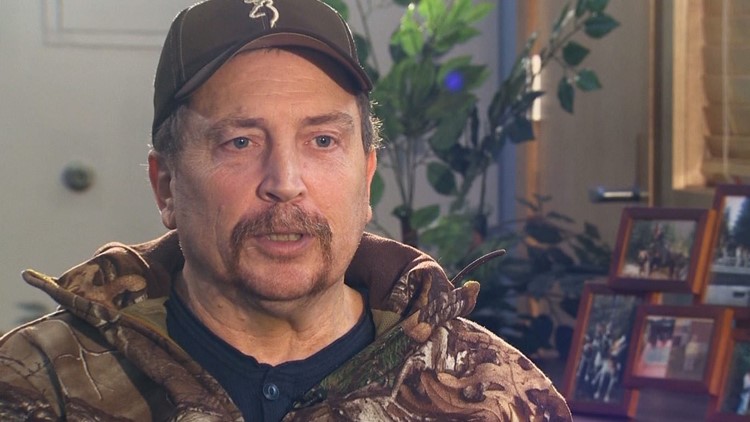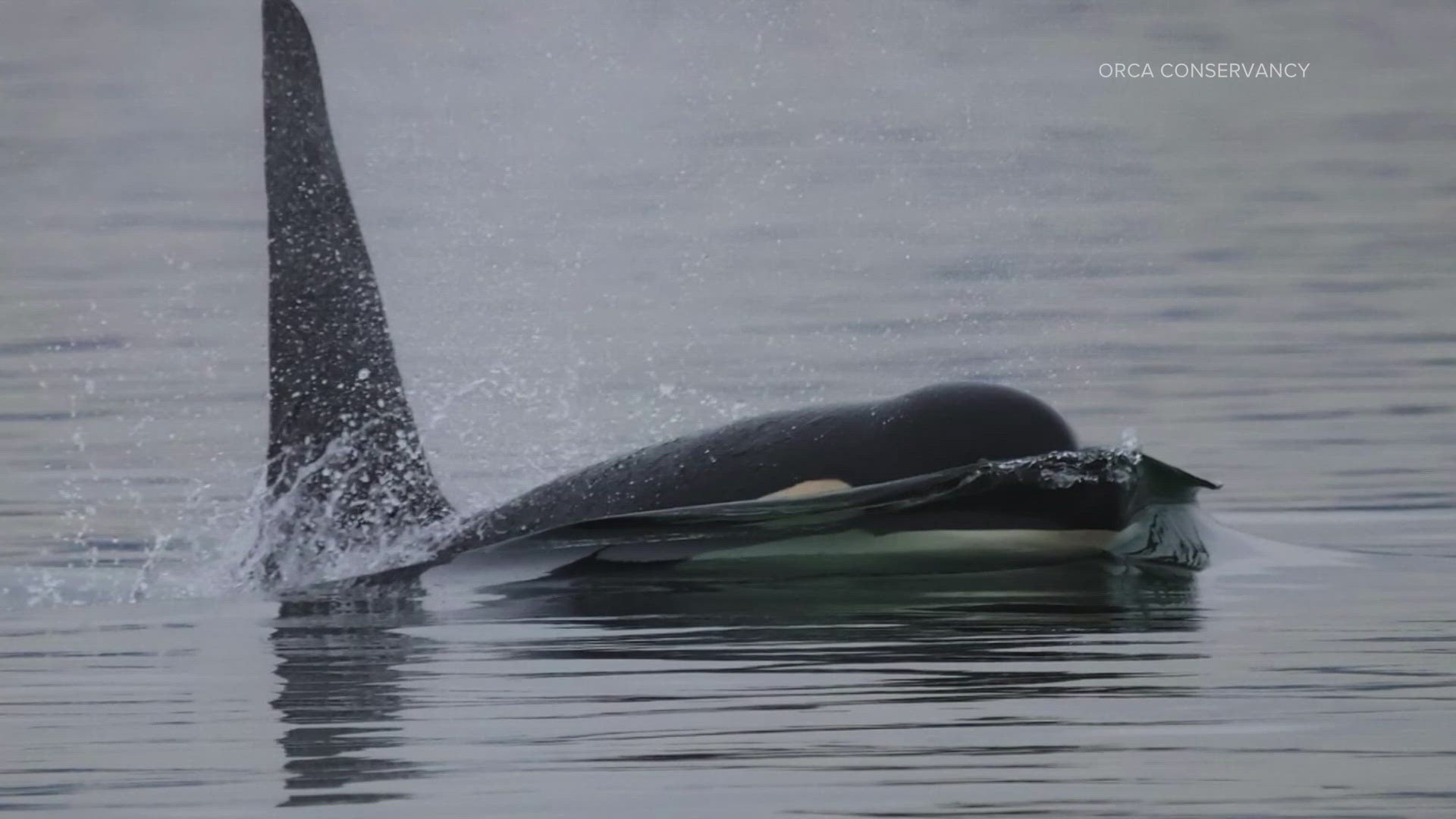WARNING: Videos contain images of illegal hunting that some may find disturbing
A man charged in one of Washington's largest poaching rings is breaking his silence, but not to defend himself or explain his side of the story.
Lifelong hound hunter Eddie Dills is accusing the Washington Department of Fish and Wildlife of the same crimes that might send him to jail someday.
In 2017, WDFW charged Dills as part of a group responsible for poaching more than a hundred animals, including elk, deer, bobcat and bear. Wildlife police claim he used dogs to hunt, a practice banned by voters in the 1990s. He didn't pay for proper permits, either. Officers discovered dozens of deer and elk carcasses left to rot, and later found their heads taken for trophies.
Dills says he would never leave deer to rot as wasted food, but won't say much about poaching bears. He won't confirm or deny his involvement in graphic cell phone video obtained by WDFW that shows bears in the last few seconds of their lives -- before hunters fire shots, sending black balls of fur toppling dozens of feet to barking dogs below.
"I can't go into that. There have been a lot of lies told to get us into that," Dills said.
Though Dills admits he's not sure anyone will believe him, he argues that he's being charged with a crime the state is committing: hunting bears indiscriminately with the use of hounds.
Initiative 655 outlawed hound hunting as well as using bait to hunt bears and cougars. In a two-year-long investigation, however, KING 5 has learned about a secret bear hunt that uses both practices behind locked gates on timber farms each spring.
A loophole in I-655 allows baiting and hound hunting to continue if used by agents of the state to target problem animals, though baiting is only allowed with snaring, not hound hunting.
Hundreds of documents requested through public records reveal a different story from WDFW, who permits timber farms to contract with hunters to remove bears that peel trees for food. When they peel the trees, they peel away profits. But in hundreds of documents obtained by KING 5, it's clear the state's own staff thinks the hunting program is being abused against the spirit of the law. Hound hunters working for timber farms aren't targeting bears that damage trees. They're killing any bear that's nearby.
Internal staff complaints about the Bear Timber Depredation Management (BTDM) program reveal years of ignored efforts to bring it into compliance with the law.
"They're accusing us of these horrifying inhumane crimes yet the game department is allowing the timber companies to do exactly the same thing. There's no way that's right," Dills said. "Why am I being accused of this and they're doing it and getting away with it?"
Dills is talking about the annual state-sanctioned bear hunts using dogs, often behind locked gates, deep in commercial tree stands.
In some years, WDFW has authorized the killing of about 300 bears. In 2016, 86 bears were killed in the name of timber damage. Most of the hunts occur in concentrated spots, leaving critics to wonder the effects of taking 20 percent of an area's bears in just a few weeks.
Hundreds of internal documents obtained through public disclosure show WDFW is experiencing a bear mutiny as staff members grow more frustrated when each timber hunting season comes and goes with little if any significant change.
WDFW's own staff criticizes management for doing nothing while companies like Weyerhaeuser use the legal loophole to create a "large hunting ground," according to staff emails. They describe it less like a damage control program and more like an exclusive hunting season that defies the law while unfairly allowing a small group of privileged hunters an opportunity that the public is denied.
WDFW managers told KING 5 in 2017 that fewer bears meant fewer problems, so timber farms have received kill permits for the previous year's damage, before bears even damage trees. Game Division manager, Anis Aoude, called it good customer service.
New management appears to be more cautious.
Dan Brinson, formerly with the state's wildlife police force, took the reins on the program a year ago.
"I thought I have my work cut out for me and my team here at headquarters as well as all the conflict specialists out in the field," Brinson said.
When asked how it's going so far, Brinson replied, "Slower than I'd hoped."
Though no significant changes have been made to the hunting permits, one thing is different this year. At the writing of this article, no historical damage permits have been issued. Brinson says they've stopped the practice of giving timber companies kill permits on damage from a previous year. The damage must be new.
Brinson also plans to create a group of stakeholders similar to the Wolf Advisory Group. That group has yet to meet and the chosen mediator is a controversial figure: Donny Martorello. Once the WDFW Wolf Policy Lead, Martorello has been plagued with criticism over his handling of wolves in Washington.
Brinson stands by his choice and his path.
"If it takes time it's worth that time because we want to make sure we get it right," Brinson said.
But the clock is ticking and several groups are poised to sue.
After KING 5's initial reports, groups like the Humane Society and the Center for Biological diversity threatened lawsuits if no changes were made.
The letter written by the Humane Society to WDFW in late 2017 reads, "...through the Program, WDFW has stretched those narrowly prescribed exemptions in the law far past their intended reach."
A letter written by the Center for Biological Diversity to WDFW in February 2018 reads, "The Program authorizes the killing of black bears for the purported purpose of protecting commercial timber stands. In reality, it has created a private hunting season for a favored group of hunters, allowing them to kill bears using barbaric methods outlawed by the voters of the state… Should the Department fail to demonstrate that it has remedied these legal violations in advance of issuing additional permits this spring, the Center is prepared to bring immediate legal action, including seeking an injunction against the exercise of any permits granted under the program."
KING 5 found hunters caught breaking rules are rarely charged with crimes.
"What we're being accused of and what they're doing - they're identical," Dills said. "I'm not saying we did anything. We're being accused right now. But they're getting away with it. It's allowed. They're allowed to do whatever they want to kill bears."
Dills agrees, and admits he was once part of the system. He recounts hunting for timber farmers who said 'forget the rules, go out and kill.' It's the same story KING 5 heard from several hunters.
"We were told, 'You're in there to kill bears, go kill them.' That's what we had to do," Dills said.
When asked about the rules described in each kill permit, Dills said the rules are rarely followed.
"The rules didn't matter," Dills said. "Because no one enforces them. They don't want them enforced because they want the bear killed."

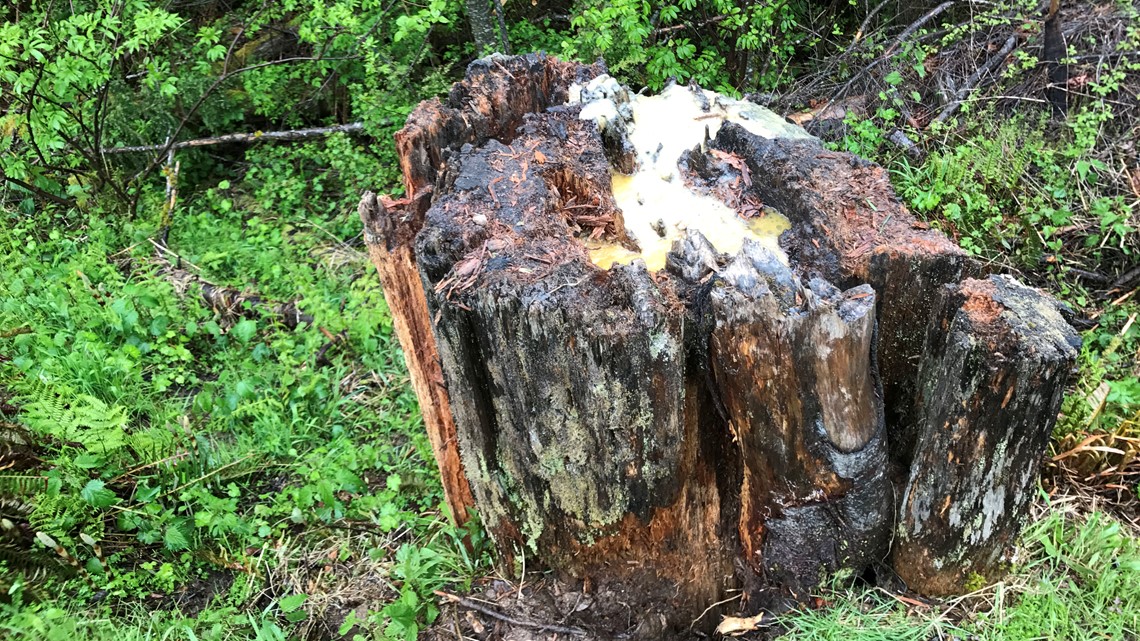
Last year, wildlife officers found tree stumps filled with cooking grease in a hunt zone on a timber farm near Randle, owned and operated by Olympic Resource Management.
"We have identified four locations…baited with grease on stumps," one report reads.
An officer says that hunters are "attracting bear by illegal means."
However, when officers tried to file charges, the case was declined due to legal concerns over the program's inconsistent rules.
"The prosecutor, who is very aggressive and passionate about wildlife cases, was not willing to proceed with any criminal prosecution since there was major concerns about the overall permitting process," an enforcement officer writes.
In response, another wildlife specialist complains that "inconsistency" has "completely tied the hands of our Enforcement to address gross violations."
"I would like to see any person who's deliberately violating our rules to be prosecuted to the fullest extent," Brinson said.
Brinson agrees that greased stumps violate the spirit of the timber hunts. But he admits the topic is muddied due to a supplemental bear feeding program that has little if any rules.

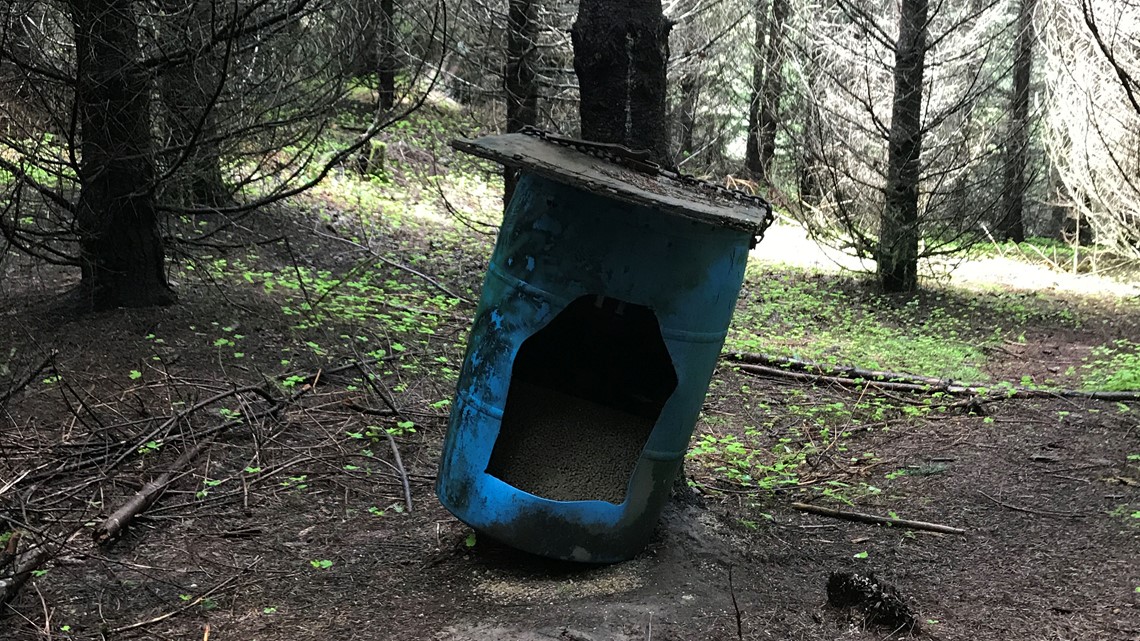
Every spring, large barrels are put out on timber farms around Western Washington and filled with bear feed. Timber farmers believe the feed gives bears an alternative nutritional source so they won't eat trees, thereby reducing the need to kill them. But there is no clear definition about what constitutes allowable feed. Some timber farmers have used cat food. It's common to hang beaver carcasses above barrels to attract bears toward them.
Though the feed must be removed when hound hunters begin, internal documents show that some hunters just dump the feed out on the ground.

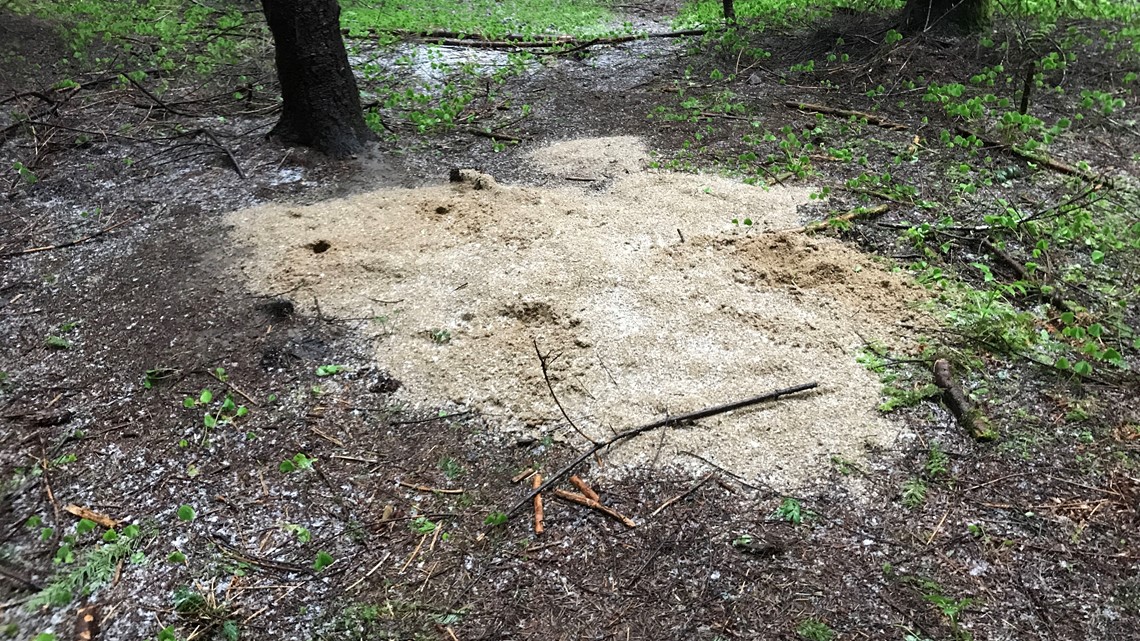
The Washington Forest Protection Association told KING 5 that greasing stumps is a common practice to lure bears toward feed stations.
Olympic Resource Management sent KING 5 the following statement about the greased tree stumps:
"ORM has investigated the claims made in the June KING-TV report regarding management of black bears in Washington. ORM has never authorized the use of attractants to hunt bears or other animals. Bear feeding stations commonly are provided each spring on Western Washington tree farms to give black bears a supplemental food source as they emerge from hibernation, so they do not strip the bark off trees to eat the new wood underneath, killing the trees. Feeding stations cannot be used to attract bears for hunting and in applying for future depredation permits, ORM will inspect those areas to confirm that there is no residual bear feed or other artificial attractants in the depredation permit area."
The Washington Forest Protection Association sent KING 5 the following statement as well:
"It is illegal to bait bears for hunting. It is legal to provide supplemental feed for black bears in the spring to deter them from peeling, or debarking trees. The purpose is to avoid lethal removal of bears that damage private property. It is lawful to use attractants to bring bears to the supplemental feeding station because there is no intent to hunt. Some timberland owners provide this supplemental food source, so bears don't debark their trees, in compliance with the law. Timberland owners do not bait black bears or use attractants for hunting because it is illegal."
For Brinson, the supplemental feeding program's efficacy and management is a pressing concern.
"In my opinion, yes. Yes, that is a root, base question," he said.
Brinson says the BTDM program is one rooted in a time that resists change. When asked what's at stake if it does not change, he said "trust".
"Trust from the public. Trust from the stakeholders that the Department of Fish and Wildlife is doing its job professionally managing our resource and being the steward we're supposed to be over the wildlife resources the state enjoys."


